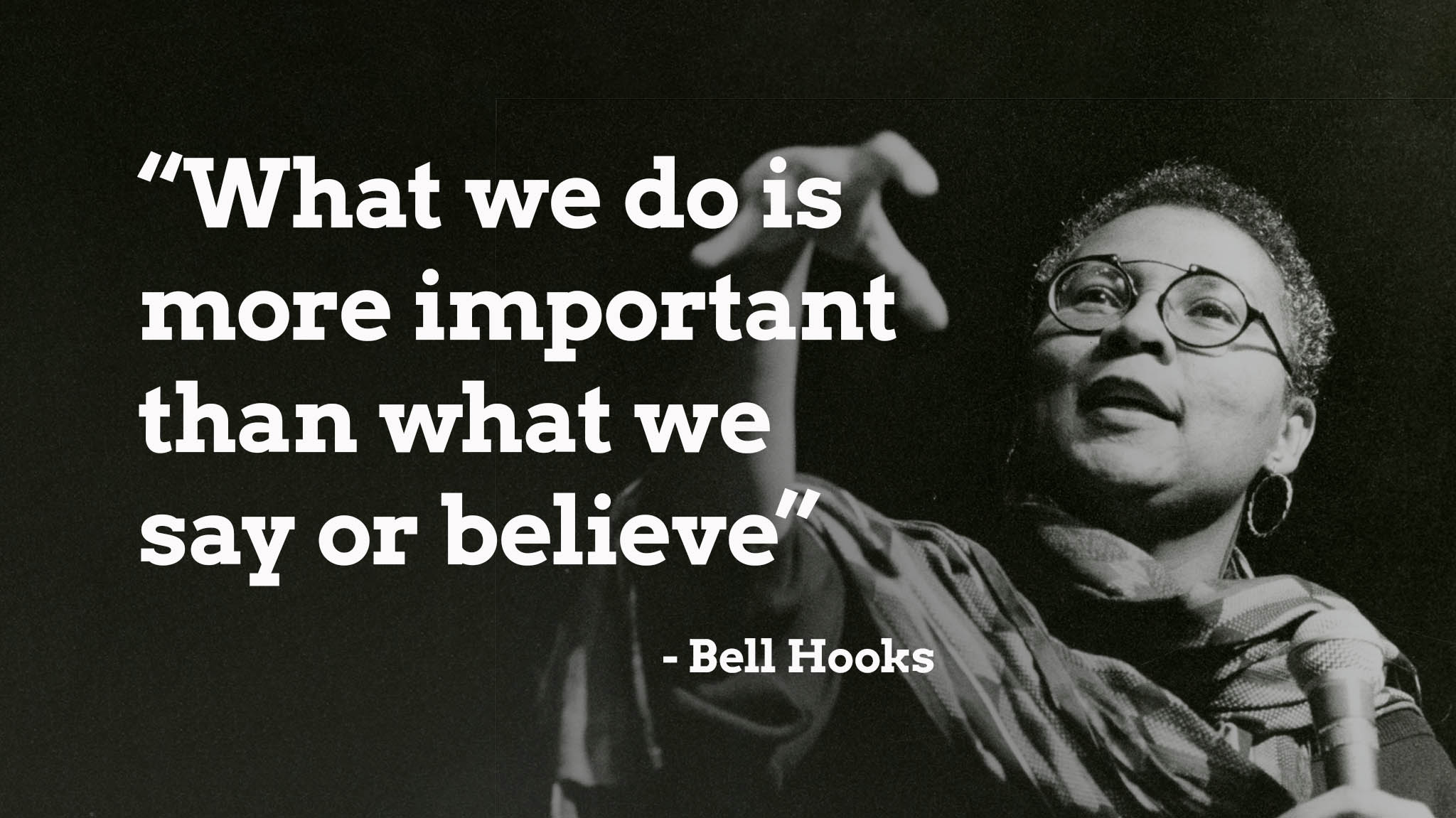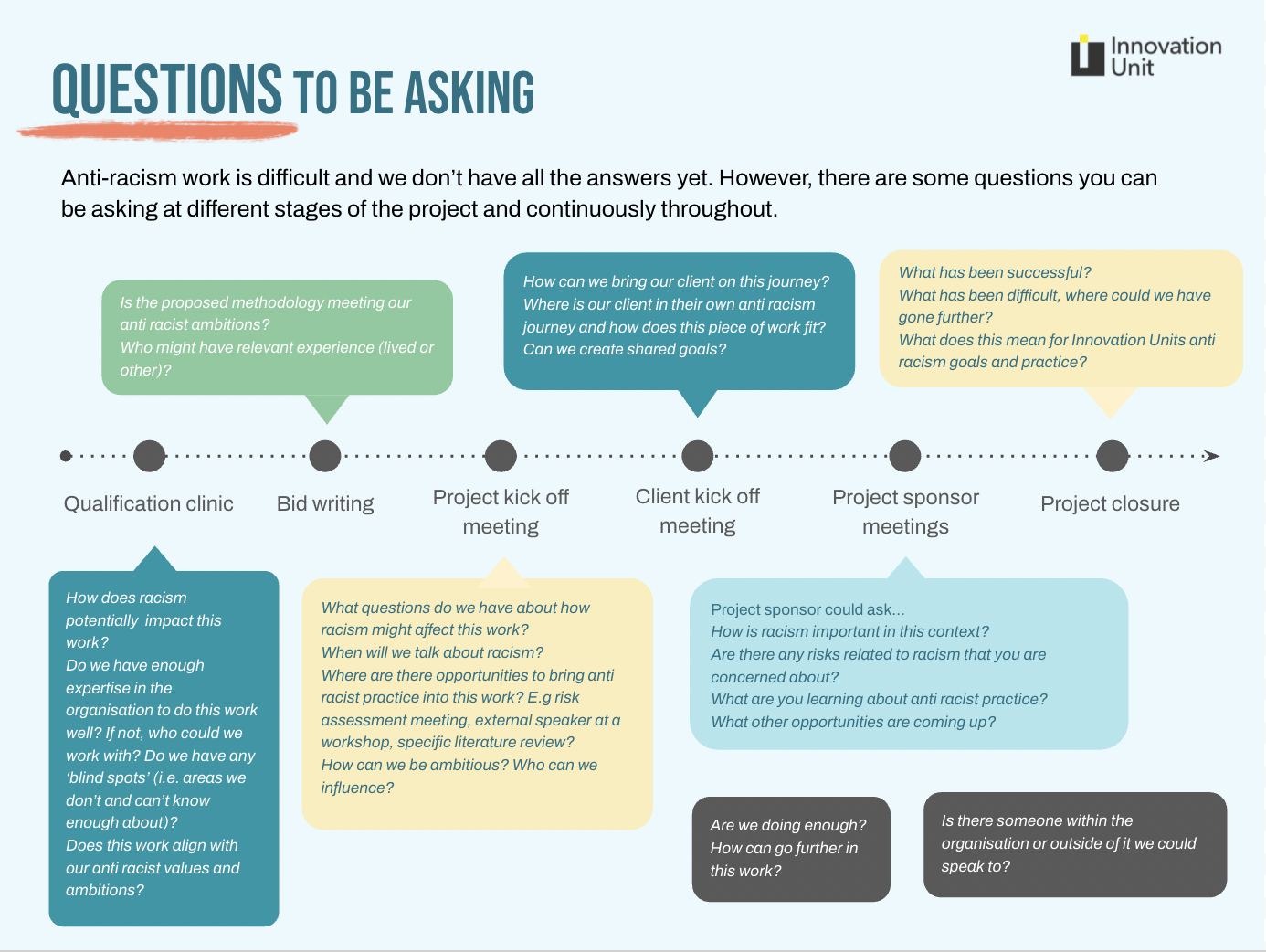
How we’re trying to bring anti racism to our practice and project work
blog | 25 Feb 2022
Last year Innovation Unit committed to becoming an anti racist organisation.
The goal of anti racism is to “actively change policies, behaviours, and beliefs that perpetuate racist ideas and actions”. It’s an important commitment, and it’s not always easy, especially if you’re determined to make a difference for the long run and not just until the next topical issue springs up.
Challenging the ‘normal’ of systemic and institutional racism takes intention, resource and critical thinking. We’ve also learnt that it can take a lot of emotional energy, especially when issues related to race appear to some people as a political stance rather than an issue of inequality and disadvantage.
Innovation Unit currently works in systems for physical and mental health, social care, education and justice. An important part of the anti racism journey has been developing our practice so that we can respond to the racism which might seep into our delivery work unchallenged and further perpetuate systems of inequality. In this blog we share key learnings so far.
Encouraging learning and collaboration
We don’t have all the answers, so generating and sharing learning as a team helps to create a collective understanding of why this work is important and what better looks like. To this end, we’ve created a fortnightly race awareness and reflection space where colleagues come together to learn from each other and problem-solve race-related challenges in projects.
Creating space and safety for teams to have brave and curious conversations about race
Talking about race is difficult, especially for the first time and within diverse groups. For some, racism can feel like an intimidating topic they’re not literate enough in and for others it’s an everyday experience.
Having race-related conversations at work needs consideration. For our race awareness book club, where a diverse group of employees worked through Layla Saeed’s ‘Me and White Supremacy,’ we created guiding principles together which we always read out at the start of each session. These principles remind us to be considerate of others’ lived experience, practice patience and tolerance for mistakes that will inevitably be made, to avoid making assumptions about people’s perceived social groups and to commit to learning rather than debating.
The team is encouraged to practice similar principles in their project teams because we know that in strong and safe teams, brave and curious questions can be asked. Questions such as: What is the impact of racism in the context of our project? What gaps are there in our understanding? Where are there opportunities to progress on our anti racist ambitions? Are we doing enough?
Being intentional and creating accountability
Every six months an Innovation Unit project team will be tasked with developing anti racist practice within their project. We aim to create accountability and also permission for teams to apply a race lens to the work and make space for anti racist innovation.
At the end of the six months, the team will share back what they’ve done in staff and board meetings – sharing successes, being open about failings and where they could have gone further – so each project team can build on the work done by their colleagues to develop our practice and understanding.
Our recent work with St John Ambulance designed a new programme for young people who might face barriers to accessing existing programmes. St John Ambulance were particularly interested in improving their engagement with young people from communities currently under-served by the organisation, such as young carers or care leavers. Throughout our research and design process, we sought to understand why young people of colour are less likely to get involved with St John Ambulance. We remained curious and aware of the lenses we brought to the work to avoid making assumptions and perpetuating narratives and stereotypes so often made about communities that experience disadvantage.
Ultimately, this intention meant we designed a solution that caters better for different communities and their needs. A programme that tries hard to meet young people in their own spaces and contexts, rather than asking them into an environment and agenda that doesn’t feel like theirs, for example through:
- first aid trainers who’ll have a more in depth understanding of race related issues and are less likely to cause harm through Diversity and Inclusion training
- first aid training that includes content on how race can affect health outcomes
- various ideas for inclusive practice being encouraged e.g information leaflets for parents being translated into different languages.
Each Innovation Unit project looks very different so it’s important that we consider how interpersonal, systemic and institutional racism presents in different contexts or where something else might be at play. It’s this that will help us to authentically respond to it.
Getting our new approaches down on paper
Innovation Unit is full of visionaries and makers. We’ve been applying these skills to new approaches for anti racist practice and capturing these in a shared document. It includes resources such as Dartington Service Design Labs’ approach to embedding anti-racism in their research and design which illustrates race-related risks present in social impact work, and a podcast episode where Dr Aminul Hoque talks frankly about what inclusion should look and feel like for young people.
We’re also collecting evidence on how racism presents in the sectors we work, so we feel informed and confident as advocates. Tools are included, which guide teams through the critical questions they should be asking at different stages of a project and to themselves, to grow self awareness of the lens and assumptions they’re bringing to the work.

Being ambitious about influencing and bringing along others on our anti racist ambitions
We’re lucky at Innovation Unit to work alongside stakeholders and clients who are able to make a difference to people’s lives. Through initiating more conversations with partners about racism we’ve learnt how others are thinking about and working on these issues. When it comes to taking action, levels of confidence and the extent to which this is prioritised varies. One clear thing we can do is bring conversations about racism to the tables that we sit at, and lead them with confidence and humility where it’s not being mentioned.
Reviewing and changing the way Innovation Unit works
As an organisation, we’ve also looked at what we can put in place for colleagues to support our anti racist journey. These include:
- race awareness training for the whole IU team of staff, board and associates
- an updated research policy which considers equity and power
- an updated diversity, equity and inclusion policy which makes a proactive and wide-ranging commitment to addressing inequalities in our own organisation
- the creation of a people of colour support group
- a review of pay and progression in relation to race and equalities
- introducing a question about race and equalities into our deliberation and decision-making about the work we take on
What next?
If we’re serious about making change we need to work with others. We’re eager to find opportunities for reciprocal learning with those who do similar work to ourselves, to partner with organisations or individuals who have expertise that we lack, and to work with clients who are committed to anti racist work. If you’d like to explore anti racism with Innovation Unit, please contact Winnie Armah.
We’ll continue to share our learning and progress. With the varying nature and complexities of our project work, we’re sure to make more mistakes and be met with new challenges. We’ll try our best to face them with bravery, humility and critical thinking.
I’m not looking to tell people what to do. People are very willing to give up their agency and look for leadership when they feel impassioned about something and I don’t want that at all, I want them to use their critical thinking skills to challenge racism and I can’t tell them how to do that.
Imagine you had a partner who you were hoping might be able to improve their perspective on something, and instead they say, “just tell me what to do”. That tells me that person isn’t willing to take on any level of responsibility and I guess what I’m trying to do is prompting people to take responsibility for racism. That takes initiative and using your own brain.Reni Eddo-Lodge, Author